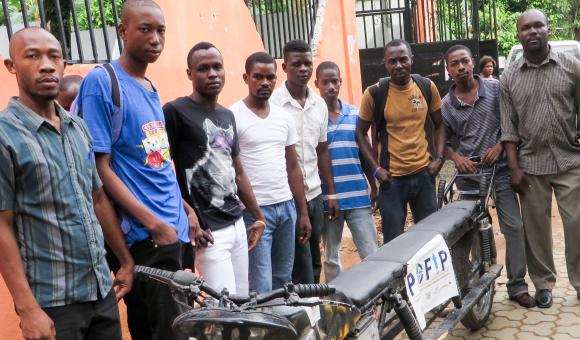
Mobile training is a strategy tried out since 2013 by the APEFE as part of the implementation of the Orientation, Training and Professional Integration Programme (POFIP) in Haiti. Over 400 young people have already participated.
Developed in partnership with the Office of the Secretary of State for Vocational Training (BSEFP) and the National Institute of Vocational Training (INFP), mobile training, tried out by the Association for the Promotion of Education and Training Abroad (APEFE), offers young people from areas lacking in training facilities in situ technical training sessions – in reinforced masonry, agricultural techniques, or motorcycle repair - along with business creation and management courses.
With a total duration of 440 hours, each session is validated at the end with a certificate of professional competence that is recognised on the labour market. This initiative is designed specifically for vulnerable young people under the age of 35 who are outside the system or who have dropped out of school.
After an experimental phase, the Orientation, Training and Professional Integration Programme (POFIP) is launching the evaluation of the mobile training courses in the remotest parts of the country. The objective of this survey is twofold: to demonstrate the impact of the mobile training strategy and identify the success factors, in order to evolve towards a more comprehensive, systematic and systemic approach that can be a model for all national and international actors in this field.
The survey
The first part of the survey, conducted in March 2016, focuses on the six remote villages of Aquin, Anse-à-veau, St Michel de l'Attalaye, Camp-coq, Ennery and Labadie located in the region of Artibonite. Johnny Derlicieux, the programme’s technical assistant, specialised in orientation and vocational integration, travelled there to meet the young people trained in August 2015 in order to pinpoint, six months later, the main factors leading to the success of the strategy. By analysing the employment situation, the match between the skills acquired and the profession exercised and the overall satisfaction rate of the trained young people, the survey makes recommendations to facilitate decision-making by the authorities responsible for the programme management.
Right from the first phase of its implementation, the survey already highlights the positive development of the sustainable integration potential of young people on the labour market and the significant improvement in their living conditions. It also recommends maintaining the focus on the evolution of training needs, on the verification of the criteria for selecting participants and on the establishment of a monitoring and support system, necessary to allow young entrepreneurs to gradually enter the formal economy.
Outlook and recommendations
Additional training is being considered for the "motorcycle" sector, as well as a campaign to raise awareness among local population groups to encourage openness to new methods of construction and professional solidarity with the new recruits available on the construction job market.
The survey also recommended the creation of a trade association, bringing together the newly trained young people and pooling the means of production, along with the systematic support of POFIP in terms of equipment and work tools to facilitate the launch of future micro enterprises.
To date, these training sessions have already been offered to nearly 400 young people and will be extended to many others via the training courses scheduled in 2016 in the electricity, cooking and pastry making and cosmetology sectors.
Adapted from a report by Johnny Derlicieux, assistant adviser of the Orientation, Training and Vocational Integration Programme in the Republic of Haiti.